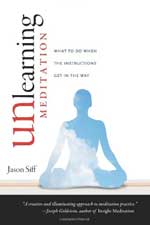 We’re currently reading Jason Siff’s Unlearning Meditation: What to Do When the Instructions Get In the Way at the Tricycle Book Club. For the next four weeks, Siff will be providing you with articles, meditation instructions, and most significantly, an opportunity for you to journal your meditation sittings and look more closely at what happens in meditation. Below are Siff’s basic meditation instructions for “recollective awareness meditation.” Pick up a copy and join the discussion.
We’re currently reading Jason Siff’s Unlearning Meditation: What to Do When the Instructions Get In the Way at the Tricycle Book Club. For the next four weeks, Siff will be providing you with articles, meditation instructions, and most significantly, an opportunity for you to journal your meditation sittings and look more closely at what happens in meditation. Below are Siff’s basic meditation instructions for “recollective awareness meditation.” Pick up a copy and join the discussion.
Impasses in meditation
An impasse is “a predicament affording no obvious escape” according to Webster’s Third New International Dictionary. Using that definition, one would find one’s self at an impasse in meditation when there is no “obvious” way of going through something. All of the usual methods, the bright ideas and good advice, and the right-sounding strategies and correct beliefs don’t help one go through something that one is stuck in, one’s “predicament.” There is a caged feeling around such impasses. You come face-to-face with your limitations, your ignorance, your lack of creativity, inventiveness, or insight.
It is easy to ignore such impasses when the purpose of meditation is taken to be doing the instruction correctly, trusting that doing so will eliminate all road-blocks and resolve all dead-locks. “What impasse?” You might ask. “My meditation practice is going just fine.” Of course it is, on one level: the level where you have confidence and trust in your practice, believing in its effectiveness and correctness. But I wonder if on another level you feel stuck, confused, limited, or frustrated; if there are thoughts, feelings, and memories that keep repeating themselves as you sit; or if there are certain stories, themes, and problems that keep drawing you in and won’t let go.
Working with an impasse
Every meditation practice we do leads to an impasse. Often, it is painfully obvious that what was working so well just the other day is no longer capable of delivering. The common advice meditation students get from teachers is to meditate harder. That is, to tighten around the instructions and put more time and effort into the practice. Sometimes a teacher will offer a strategy that he or she has used in a similar predicament. Occasionally they might suggest that you take a break from meditation. This instruction misses the fact that tremendous learning can arise from staying with your impasses and from exploring them more deeply.
Since I fully expect students to reach impasses, I am more than ready and willing to work with them on it. Some impasses are common for nearly everyone, and can be addressed by the approach I have presented. Other impasses—the great majority of them—are highly individual. I just can’t tell people what to do, because “doing something about it” in any form keeps them from tolerating the impasse and developing an interest in it.
The two sections above are excerpted from Chapter 9: Impasses in Meditation
Guidance for recollecting what is hard to recall
• If you can’t recall an experience after a sitting, and just have a vague memory of it, you might try recalling what came before it or after it. This is often the case with tranquil states, where you know you were aware of something but you just can’t remember it. So you might try to recall how you felt after the tranquil state, or what you initially thought about it afterward, and then you might be able recall something about the experience itself.
• When recollecting an internal dialog or monologue, you might forget some of what was said, and just have a general idea of the content. You can try recalling who was speaking at the time (Was it your voice or someone else’s?). You might also recognize the tone of voice or an attitude or mood behind the voice.
• Often we may remember one aspect of our meditative experience more than any other. For instance, someone may more easily recall bodily sensations after a sitting, but not remember emotions or moods, while another person may be the opposite and recall emotions but not sensations. This is usually reflected in one’s meditation journal. So if you read your journal and find that certain areas of experience are not mentioned, you might try to recall them and add them to your journal. Sending your journal to a teacher, or talking with a teacher about your meditation sittings, may help you become aware of aspects of your experience that you have trouble recalling.
If you have a comment or question please join the discussion here.
Thank you for subscribing to Tricycle! As a nonprofit, we depend on readers like you to keep Buddhist teachings and practices widely available.